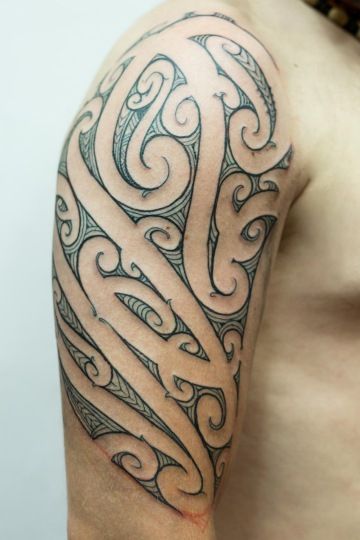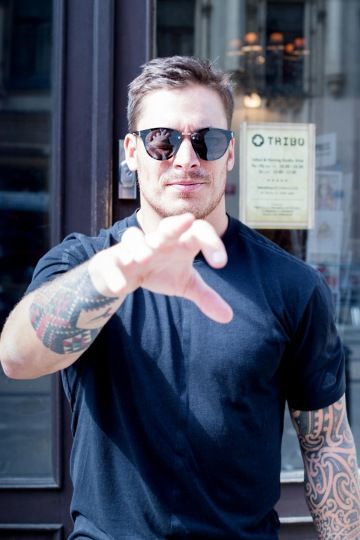Maia Gibbs
February 9, 2022

"If you don't work hard, you can't play hard"
T: Hi Maia! I must say I'm surprised, I was expecting a guy with a tattooed face working with a tattoo sticks, but you look quite like a nice guy. Will you ever get your face tattooed?
M: Well, probably not at this stage of my life. Having a face tattoo is very sacred for us, you really have to earn that tattoo. It's a serious thing..even nowadays. So not yet, but I'll probably get my get my legs and butt and back done.
T: What would you have to do, to be allowed to have a face moko?
M: You have to contribute a lot to your community. For example: To contribute positively to the growth of your Iwi (tribe) Hapu (sub-tribe) and Whanau (family) and also be a positive role model for the people around you. To carry those markings with you is very important in our culture, and with that comes the responsibility to do so in a positive way.
T: How u feel about Europeans getting maori face tattoo?
M: I don't think its right…and for a non-maori to gain those markings (facial Moko) I wouldn't call it Tā Moko. Its a sacred part of your body in our culture and and those marking hold weight. I think it should stay with us. There have been aspects of our culture stolen from us already, and I believe there are somethings that need to be kept within our culture. If you are going to have a Tā Moko (Maori tattoo), you should really know something about the culture you are getting it from, or at least be willing to learn about it.
T: When someone wants a Maori tattoo without any knowlidge about it, are you going do it?
M: The people who contact me for work usually have some sort of idea about what Maori Tā Moko is. I do feel like part of the responsibly of the Tā Moko artist is also to educate. However when I do tattoo someone for the first time, it's an opportunity for them to learn something about our culture, the more they know and learn, I feel the better experience it is for them and for myself. The Māori/Polynesian culture and its designs are very fashionable these days, but you still have to remember that these designs are thousands of years old and have survived through times of real hardship, they are very important to our people. You have to remember by getting and wearing theses designs you are becoming part of that story. Respecting the culture is paramount.


T: Could you tell us more about the symbolism?
M: Traditionally the Tā Moko symbolised your position in your community. E.g. if you were a warrior you would wear markings to represent that, if you where a gardner you would wear markings to represent that, If you a Chief ect.
However, through the colonisation period the culture was pushed quite literally to the edge of disappearing, so everything has changed a lot from then until now, witch is represented within the different aspects of our culture. Now I believe it's about indigenous pride. Be proud of who you are, who you belong to and representing that in a positive way. I think also using Tā Moko to represent milestones in your life for example things you have accomplished, achieved or contributed to your people.
T: What can you recognise from the patterns?
M: Theres are a lot of different patterns in our culture, for example from a Māori design point of view things that are rectilinear tend to represent the female aspects of our culture.
T: How about the traditional techniques, do those old masters continue to work with a stick?
M: Yes, the term is “Uhi", there are some people who are doing it and in the process of trying to revive it. In general it's used more by the Polynesian masters/tattooers these days. From a traditional point of view how Māori tattooed was quite different to the other Polynesian cultures. In terms of the application we had developed our techniques to carve out the skin like wood before applying the pigment, and from the european records taken at the time, we were able to do so in a very accurate fashion. But of course, the healing of process was much longer. After the colonisation period there was a law that was passed by the crown that meant we weren't able to practice these customs, it was called “The Tohunga Suppression Act” coupled with the confiscation of land, very poor living conditions and the innovation of foreign deceases lead to the rapped decline of our culture and the different aspects associated with it.
T: It must have been hard times for you, but it's important that you managed to preserve your culture. So is it still possible to get the original tattoo made by Uhi?
M: Yes there are some people are still doing it. Check out tradicional masters like Te Rangitu Netana and Heemi Te Peeti , or see the documentary movie for more.


T: You are also a professional rugby player, isn't it hard to be good at both? Even now, when the seasons are super long is here?
M: No, I love it! it’s good for me to combine both of these "jobs" they are so different! Doing both allows me to relax and feel comfortable in what I'm doing both mentally and physically. I love them both and I'm in a very fortunate position! I'm able to put a roof over my head and food on the table doing something I love to do, anything else is a bonus for me. I know not many people can say that.
T: How did you enjoy the Saturday game here in Prague?
M: I loved it! the support we haven been given by the local people has been amazing! It has defiantly been a humbling experience and if the opportunity come around again I would love to be involved! It was my first time to Prague but it will not be my last! beautiful place!
T: The match Czech Republic vs. NZ Ambassadors was the third in a row? Does it seem to you, that the skills of our Czech Team are getting better? The line between your and our team is so wide, but I believe that matches like this, are going to be a good impulse to the future, even if the results are not very good so far.
M: Yes the NZ Ambassadors have been coming here for the last three years. I think so, the game gets a lot of national attention and there is a lot of emphasis put on the Czech team. With out doubt the Czech team is getting better, and playing teams like ourselves can only benefit rugby over here. You only haft to see how excited the youth are around this event to see that rugby in Czech is in a good place, and will continue to grow.

Text & foto: TerkaTetris
See more Maia Gibbs Arts